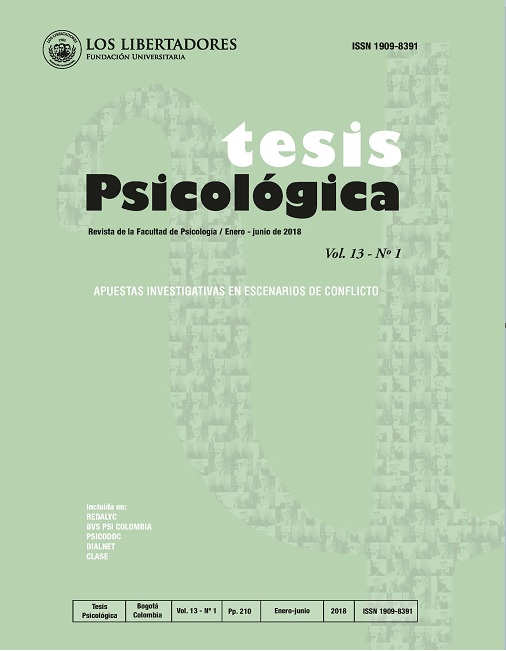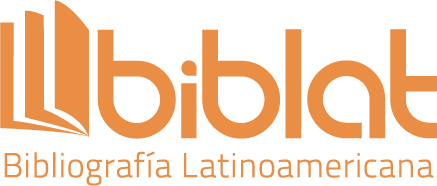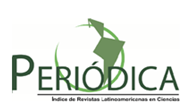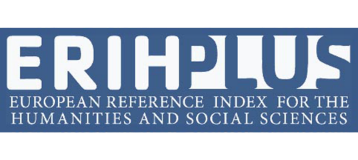Motivación y estrategias de aprendizaje en estudiantes de la Universidad de Caldas
DOI:
https://doi.org/10.37511/tesis.v13n1a6Resumen
La presente investigación describe el comportamiento de estudiantes de una universidad colombiana ante una prueba validada a partir de la cual se pueden apreciar componentes motivacionales y uso de estrategias de aprendizaje en los sujetos. Se analizó la correlación de subcategorías entre una escala de motivación y una escala de estrategias de aprendizaje, a fin de establecer el tipo de asociaciones que pudieran darse. Participaron en la investigación 547 estudiantes de diferentes programas de pregrado de la Universidad de Caldas, a los cuales se les aplicó el Cuestionario de Motivación y Estrategias de Aprendizaje (CMEA). Se encontró correlación positiva entre orientación a metas intrínsecas con orientación a metas extrínsecas, valor de la tarea y autoeficacia para el aprendizaje; orientación a metas extrínsecas con valor de la tarea, creencias de control, autoeficacia para el aprendizaje y ansiedad ante los exámenes; valor de la tarea con autoeficacia para el aprendizaje y creencias de control con ansiedad ante los exámenes. Todos los ítems de la escala de estrategias de aprendizaje (menos la regulación del esfuerzo) se correlacionan entre ellos de manera positiva, la regulación del esfuerzo no se asoció al aprendizaje con elaboración. Así mismo, cuando se cruzaron los ítems de la escala de motivación y de las estrategias de aprendizaje, nuevamente las asociaciones fueron directas en la mayoría de los casos, excepto para creencias de control contra organización y creencias de control contra aprendizaje con compañeros.Descargas
Los datos de descarga aún no están disponibles.
Referencias
Archer, J. (1994). Achievements goals as a mesasure of motivation in university students. Contemporary Educational Psychology, 19, 430-446.
Azevedo, R (2009). Theoretical, conceptual, methodological, and instructional issues in research on metacognition and self-regulated learning: A discussion. Metacognition Learning 4:87–95 DOI 10.1007/s11409-009-9035-7
Ayala – Peña, A (Ed). Metacognition: Fundaments, Applications and Trends. New York: Springer International.
Balconi, M (2010). Neuropsychology of the sense of agency. Italia: Springer.
Buratti, S., Allwood, M (2015). Regulating Metacognitive Processes—Support for a Meta-metacognitive Ability. In Ayala – Peña, A (Ed). Metacognition: Fundaments, Applications and Trends. (pp. 17- 38). New York: Springer International
Daniel, W (2002). Bioestadística. Base para el Análisis de las Ciencias de la Salud. México D.F: Limusa Wiley.
Duda, J & Nicholls, J. (1992). Dimensions of achievement motivation in Schoolwork and sport. Journal of Educational Psychology, 84,290-299.
Dunlosky, J. & Rawson, K. A. (2012). Despite their promise, there’s still a lot to learn about techniques that support durable learning. Journal of Applied Research in Memory and Cognition, 1 (4), 254 – 256.
Dunlosky, J. & Rawson, K. A. (2012). Overconfidence produces underachievement: Inaccurate self ecaluations undermine student’s learning and retention. Journal Learning and Instruction, 22, 271-280.
Flavell, J (1979). Metacognitive and Cognitive monitoring: a new área of cognitive developmental inquiry. American Psychology, 34 (10), 906 – 911.
Flavell, J (1987). Speculation about nature and development of metacognition. In Weinert, F., Kluwe, R (1987). Metacognition, motivation and understanding. New Yersey: Hillsdale.
García., T. & Pintrich P. (1991). Student motivation and self regulated learning: A LISREL model. Paper presented at the Annual meeting of the American Research Association, Chicago, IL.
Granados, H. & Gallego, F. (2016). Motivación, aprendizaje autorregulado y estrategias de aprendizaje en estudiantes de tres universidades de Caldas y Risaralda. Revista Latinoamericana de Estudios Educativos, 12 (1), 71-90.
Gutiérrez, A (2013). Enhancing the Calibration Accuracy of Adul Learners: A multifaceted intervention. University of Nevada. Disponible en línea: http://digitalscholarship.unlv.edu/cgi/viewcontent.cgi?article=2569&context=thesesdissertations. Consultado el 8 de Octubre del 2016.
Hernández, R., Fernández, C. & Baptista, M (2010). Metodología de la investigación. México: Ed McGraw Hill, 656.
Koriat, A (1997). Monitoring One's Own Knowledge During Study:A Cue-Utilization Approach to Judgments of Learning. Journal of Experimental Psychology: general, 126, (4), 349-370
Koriat, A., & Bjork, R. A. (2006). Illusions of competence during study can be remedied by manipulations that enhance learners' sensitivity to retrieval conditions at test. Memory & Cognition, 34, 959-972.
Koriat, A., Maayan, H., & Nussinson, R (2006). The Intricate Relationships Between Monitoring and Control in Metacognition: Lessons for the Cause-and-Effect Relation Between Subjective Experience and Behavior . Journal of Experimental Psychology: General, 135 (1), 36–69.
Kuhn, D (2000). Metacognitive Development. American Psychological Society, 9 (5), 178 – 181.
López, O., Hederich, C., Camargo, A (2012). Logro en matemáticas, autorregulación del aprendizaje y estilo cognitivo. Revista Suma Psicológica, 19 (2): 39-50
Martín, M., Bueno, J. & Ramírez, M. (2010). Evaluación del aprendizaje autorregulado en estudiantes de Bachillerato mexicanos. Revista Aula Abierta, 38 (1), 59-70.
Monereo, C. (2001). La enseñanza estratégica. Enseñar para la autonomía. Aula de Innovación, 100, 6-10.
Multon, K. & Brown, S. (1991). Relation of self efficacy beliefs to academic outcomes: a meta-analytic investigation. Journal of counseling Psychology, 38, 30-38.
Nelson, T. O., Narens, L. (1990). Metamemory: a theoretical framework and new findings. In Bower, G. H. (Ed.). The psychology of learning and motivation, Vol. 26 (pp. 125 - 173). New York: Academic Press.
Nelson, T.O. (1992). Metacognition: Core Readings. Boston: Allyn and Bacon.
Nocito, G. (2013). Autorregulación del aprendizaje de alumnos de grado. Universidad complutense de Madrid. Disponible en línea: http://eprints.ucm.es/24036/1/T35049.pdf. Consultado Octubre 7 del 2016.
Núñez, J., González – Pienda, J. & Rosario, P (2006). Evaluación de los procesos de autorregulación mediante el autoinforme. Psicothema, 18 (3), 353-358.
Panadero, E (2017). A Review of Self-regulated Learning: Six Models and Four Directions for Research. Front. Psychol. 8: (1-28). doi: 10.3389/fpsyg.2017.00422
Peña- Ayala, A., Cárdenas, L (2015). A Conceptual Model of the Metacognitive Activity. In: A. Peña (Ed). Metacognition: Fundaments, applications, and trends. (pp.39-64). New York: Springer international.
Pierce, S. H., & Lange, G. (2000). Relationships among metamemory, motivation and memory performance in young school-age children. British Journal of Developmental Psychology, 18, 121–135.
Pintrich, P., De Groot, E (1990). Motivational and Self regulated learning components of classroom academic performance. Journal of Educational Psychology, 82 (1), 33-40.
Pintrich, P. R., Smith, D. A., García, T. & McKeachie, W. J. (1991). A manual for the use of the Motivated Strategies for Learning Questionnaire (MSLQ). Ann Arbor, MI: NCRIPTAL: The University of Michigan.
Pintrich, P., Smith, D., García, T., & McKeachie, W. (1993). Reliability and predictive validity of the motivated strategies for learning questionnaire (MSLQ). Educational and Psychological Measurement, 53, 801-803.
Pintrich, P. (2004). A conceptual framework for assessing motivation and self–regulated learning in college students. Educational Psychology Review, 16, 385–407.
Ramírez, M. (2016). Modelo causal de los factores asociados al aprendizaje autorregulado como mediador del rendimiento académico en estudiantes universitarios. (Tesis Doctoral). Universidad Complutense de Madrid, Madrid. Recuperada de: file:///Users/luzestela/Desktop/DIANA%20/Modelo%20causal%20de%20los%20factores%20asociados%20al%20aprendizaje%20autorregulado%20como%20mediador%20del%20rendimiento%20a.webarchive
Ramírez, M., Canto, J., Bueno, J. & Echazarreta, A (2013). Validación Psicométrica del Motivated Strategies for Learning Questionnaire en Universitarios Mexicanos. Electronic Journal of Research in Educational Psychology, 11(1), 193-214
Rothman, A., Baldwin, A., Hertel, A. & Fuglestad, P. (2011). “Self-Regulation and Behavior Change: Disentangling Behavioral Initiation and Behavioral Maintenance.” In: Vohs, K. & Baumeister, R. Handbook of self-regulation. Research, Theory, and Applications. New York: Guilford Publications. Pp. 106-122.
Sawyer, K. The Cambridge Handbook of the Learning Sciences. New York: Cambridge University Press.
Sheskin, D. (2007). Handbook of parametric and nonparametric statistical procedures. Boca Ratón, FL: Ed. Chapman & Hall/CRC.
Schraw, G., & Gutiérrez, A (2015). Metacognitive strategy instruction that highlinghts the role of monitoring and control processes. In: Peña, A (2015). Metacognition: Fundaments, applications, and trends. New York: Springer international. Págs. 3-15
Schunk, D. (2012). Teorías del aprendizaje. Una perspectiva educativa. México: Editorial Pearson.
Schunk, D. & Zimmerman, B. (1994).Self-regulation in education: retrospect and prospect. En D. H. Schunk y B. J. Zimmerman (Eds.), Self-regulation of learning and performance. Issues and educational applications. Hillsdale, NJ: Erlbaum.
Suarez, Jose Manuel; Fernandez, Ana Patricia (2011). A Model of How Motivational Strategies Related to the Expectative Component Affect Cognitive and Metacognitive Strategies. Electronic Journal of Research in Educational Psychology, 9 (2), 641-658.
Suárez, J., Fernández, A., Sánchez, V., & Zamora, Á (2016). Incidencia de las estrategias motivacionales de valor sobre las estrategias cognitivas y metacognitivas en estudiantes de secundaria. Revista Complutense de Educación, 27 (2), 421- 435
Tarricone, P (2011). The Taxonomy of Metacognition. New York: Psychology Press
Winne, P., Azevedo, R (2014). Metacognition. In Sawyer, K. The Cambridge Handbook of the Learning Sciences. (63- 87). New York: Cambridge University Press.
Wolters, C. (1998). Self-regulated learning and college student’s regulation of motivation. Journal of Educational Psychology, 90, 224-235.
Zimmerman, B (1989). A social cognitive view of self-regulated academic learning. Journal of Educational Psychology, 81 (3), 329-339.
Zimmerman, B. & Schunk, D. (1989). Self-regulated learning and academic achievement. Theory, research and practice. NY: Springer-Verlag.
Zimmerman, B. (2008). Investigating self – regulation and motivation: Historical background, methodological developments, and future prospects. American Educational Research Journal, 45, 166- 183
Azevedo, R (2009). Theoretical, conceptual, methodological, and instructional issues in research on metacognition and self-regulated learning: A discussion. Metacognition Learning 4:87–95 DOI 10.1007/s11409-009-9035-7
Ayala – Peña, A (Ed). Metacognition: Fundaments, Applications and Trends. New York: Springer International.
Balconi, M (2010). Neuropsychology of the sense of agency. Italia: Springer.
Buratti, S., Allwood, M (2015). Regulating Metacognitive Processes—Support for a Meta-metacognitive Ability. In Ayala – Peña, A (Ed). Metacognition: Fundaments, Applications and Trends. (pp. 17- 38). New York: Springer International
Daniel, W (2002). Bioestadística. Base para el Análisis de las Ciencias de la Salud. México D.F: Limusa Wiley.
Duda, J & Nicholls, J. (1992). Dimensions of achievement motivation in Schoolwork and sport. Journal of Educational Psychology, 84,290-299.
Dunlosky, J. & Rawson, K. A. (2012). Despite their promise, there’s still a lot to learn about techniques that support durable learning. Journal of Applied Research in Memory and Cognition, 1 (4), 254 – 256.
Dunlosky, J. & Rawson, K. A. (2012). Overconfidence produces underachievement: Inaccurate self ecaluations undermine student’s learning and retention. Journal Learning and Instruction, 22, 271-280.
Flavell, J (1979). Metacognitive and Cognitive monitoring: a new área of cognitive developmental inquiry. American Psychology, 34 (10), 906 – 911.
Flavell, J (1987). Speculation about nature and development of metacognition. In Weinert, F., Kluwe, R (1987). Metacognition, motivation and understanding. New Yersey: Hillsdale.
García., T. & Pintrich P. (1991). Student motivation and self regulated learning: A LISREL model. Paper presented at the Annual meeting of the American Research Association, Chicago, IL.
Granados, H. & Gallego, F. (2016). Motivación, aprendizaje autorregulado y estrategias de aprendizaje en estudiantes de tres universidades de Caldas y Risaralda. Revista Latinoamericana de Estudios Educativos, 12 (1), 71-90.
Gutiérrez, A (2013). Enhancing the Calibration Accuracy of Adul Learners: A multifaceted intervention. University of Nevada. Disponible en línea: http://digitalscholarship.unlv.edu/cgi/viewcontent.cgi?article=2569&context=thesesdissertations. Consultado el 8 de Octubre del 2016.
Hernández, R., Fernández, C. & Baptista, M (2010). Metodología de la investigación. México: Ed McGraw Hill, 656.
Koriat, A (1997). Monitoring One's Own Knowledge During Study:A Cue-Utilization Approach to Judgments of Learning. Journal of Experimental Psychology: general, 126, (4), 349-370
Koriat, A., & Bjork, R. A. (2006). Illusions of competence during study can be remedied by manipulations that enhance learners' sensitivity to retrieval conditions at test. Memory & Cognition, 34, 959-972.
Koriat, A., Maayan, H., & Nussinson, R (2006). The Intricate Relationships Between Monitoring and Control in Metacognition: Lessons for the Cause-and-Effect Relation Between Subjective Experience and Behavior . Journal of Experimental Psychology: General, 135 (1), 36–69.
Kuhn, D (2000). Metacognitive Development. American Psychological Society, 9 (5), 178 – 181.
López, O., Hederich, C., Camargo, A (2012). Logro en matemáticas, autorregulación del aprendizaje y estilo cognitivo. Revista Suma Psicológica, 19 (2): 39-50
Martín, M., Bueno, J. & Ramírez, M. (2010). Evaluación del aprendizaje autorregulado en estudiantes de Bachillerato mexicanos. Revista Aula Abierta, 38 (1), 59-70.
Monereo, C. (2001). La enseñanza estratégica. Enseñar para la autonomía. Aula de Innovación, 100, 6-10.
Multon, K. & Brown, S. (1991). Relation of self efficacy beliefs to academic outcomes: a meta-analytic investigation. Journal of counseling Psychology, 38, 30-38.
Nelson, T. O., Narens, L. (1990). Metamemory: a theoretical framework and new findings. In Bower, G. H. (Ed.). The psychology of learning and motivation, Vol. 26 (pp. 125 - 173). New York: Academic Press.
Nelson, T.O. (1992). Metacognition: Core Readings. Boston: Allyn and Bacon.
Nocito, G. (2013). Autorregulación del aprendizaje de alumnos de grado. Universidad complutense de Madrid. Disponible en línea: http://eprints.ucm.es/24036/1/T35049.pdf. Consultado Octubre 7 del 2016.
Núñez, J., González – Pienda, J. & Rosario, P (2006). Evaluación de los procesos de autorregulación mediante el autoinforme. Psicothema, 18 (3), 353-358.
Panadero, E (2017). A Review of Self-regulated Learning: Six Models and Four Directions for Research. Front. Psychol. 8: (1-28). doi: 10.3389/fpsyg.2017.00422
Peña- Ayala, A., Cárdenas, L (2015). A Conceptual Model of the Metacognitive Activity. In: A. Peña (Ed). Metacognition: Fundaments, applications, and trends. (pp.39-64). New York: Springer international.
Pierce, S. H., & Lange, G. (2000). Relationships among metamemory, motivation and memory performance in young school-age children. British Journal of Developmental Psychology, 18, 121–135.
Pintrich, P., De Groot, E (1990). Motivational and Self regulated learning components of classroom academic performance. Journal of Educational Psychology, 82 (1), 33-40.
Pintrich, P. R., Smith, D. A., García, T. & McKeachie, W. J. (1991). A manual for the use of the Motivated Strategies for Learning Questionnaire (MSLQ). Ann Arbor, MI: NCRIPTAL: The University of Michigan.
Pintrich, P., Smith, D., García, T., & McKeachie, W. (1993). Reliability and predictive validity of the motivated strategies for learning questionnaire (MSLQ). Educational and Psychological Measurement, 53, 801-803.
Pintrich, P. (2004). A conceptual framework for assessing motivation and self–regulated learning in college students. Educational Psychology Review, 16, 385–407.
Ramírez, M. (2016). Modelo causal de los factores asociados al aprendizaje autorregulado como mediador del rendimiento académico en estudiantes universitarios. (Tesis Doctoral). Universidad Complutense de Madrid, Madrid. Recuperada de: file:///Users/luzestela/Desktop/DIANA%20/Modelo%20causal%20de%20los%20factores%20asociados%20al%20aprendizaje%20autorregulado%20como%20mediador%20del%20rendimiento%20a.webarchive
Ramírez, M., Canto, J., Bueno, J. & Echazarreta, A (2013). Validación Psicométrica del Motivated Strategies for Learning Questionnaire en Universitarios Mexicanos. Electronic Journal of Research in Educational Psychology, 11(1), 193-214
Rothman, A., Baldwin, A., Hertel, A. & Fuglestad, P. (2011). “Self-Regulation and Behavior Change: Disentangling Behavioral Initiation and Behavioral Maintenance.” In: Vohs, K. & Baumeister, R. Handbook of self-regulation. Research, Theory, and Applications. New York: Guilford Publications. Pp. 106-122.
Sawyer, K. The Cambridge Handbook of the Learning Sciences. New York: Cambridge University Press.
Sheskin, D. (2007). Handbook of parametric and nonparametric statistical procedures. Boca Ratón, FL: Ed. Chapman & Hall/CRC.
Schraw, G., & Gutiérrez, A (2015). Metacognitive strategy instruction that highlinghts the role of monitoring and control processes. In: Peña, A (2015). Metacognition: Fundaments, applications, and trends. New York: Springer international. Págs. 3-15
Schunk, D. (2012). Teorías del aprendizaje. Una perspectiva educativa. México: Editorial Pearson.
Schunk, D. & Zimmerman, B. (1994).Self-regulation in education: retrospect and prospect. En D. H. Schunk y B. J. Zimmerman (Eds.), Self-regulation of learning and performance. Issues and educational applications. Hillsdale, NJ: Erlbaum.
Suarez, Jose Manuel; Fernandez, Ana Patricia (2011). A Model of How Motivational Strategies Related to the Expectative Component Affect Cognitive and Metacognitive Strategies. Electronic Journal of Research in Educational Psychology, 9 (2), 641-658.
Suárez, J., Fernández, A., Sánchez, V., & Zamora, Á (2016). Incidencia de las estrategias motivacionales de valor sobre las estrategias cognitivas y metacognitivas en estudiantes de secundaria. Revista Complutense de Educación, 27 (2), 421- 435
Tarricone, P (2011). The Taxonomy of Metacognition. New York: Psychology Press
Winne, P., Azevedo, R (2014). Metacognition. In Sawyer, K. The Cambridge Handbook of the Learning Sciences. (63- 87). New York: Cambridge University Press.
Wolters, C. (1998). Self-regulated learning and college student’s regulation of motivation. Journal of Educational Psychology, 90, 224-235.
Zimmerman, B (1989). A social cognitive view of self-regulated academic learning. Journal of Educational Psychology, 81 (3), 329-339.
Zimmerman, B. & Schunk, D. (1989). Self-regulated learning and academic achievement. Theory, research and practice. NY: Springer-Verlag.
Zimmerman, B. (2008). Investigating self – regulation and motivation: Historical background, methodological developments, and future prospects. American Educational Research Journal, 45, 166- 183
Descargas
Publicado
2018-12-07
Número
Sección
Perspectivas de Intervención
Licencia

Esta obra está bajo una Licencia Creative Commons Atribución-NoComercial-
Cómo citar
Montoya, D. M., Dussán Lubert, C., Taborda Chaurra, J., & Nieto Osorio, L. S. (2018). Motivación y estrategias de aprendizaje en estudiantes de la Universidad de Caldas. Tesis Psicológica, 13(1), 1-23. https://doi.org/10.37511/tesis.v13n1a6













